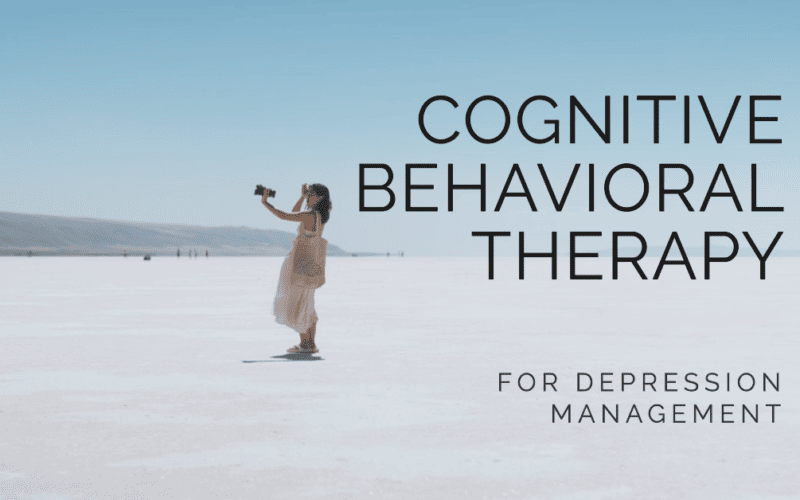The Benefits Of Cognitive Behavioral Therapy For Depression Management

Cognitive Behavioral Therapy (CBT) has been shown to be an effective way to manage depression. It combines cognitive and behavioral therapies to help those with depression to recognize and understand their thoughts and feelings, and make changes to their behavior in order to improve their mental health.
While the idea of talking about one’s feelings and emotions can be daunting, the benefits of CBT are undeniable. By recognizing negative thinking patterns, developing new skills to cope with difficult situations, and taking control of one’s mental health, CBT can help those with depression to reduce symptoms and improve their quality of life.
At the same time, CBT can provide a safe and supportive environment for individuals to explore their thoughts and feelings in order to gain insight into their experiences. It can be a powerful tool for those with depression to take control of their mental health and make positive changes in their lives.
By recognizing and addressing negative thoughts and behaviors, CBT can help individuals to develop new skills to cope with difficult situations, and better understand their thoughts and feelings. Ultimately, the goal of CBT is to help individuals to reduce symptoms of depression and improve their quality of life.
How CBT Works
Through the use of strategies such as reframing negative thoughts and identifying patterns in behavior, CBT helps individuals to gain a better understanding of how their thoughts and actions can influence their emotions. By examining the connections between thoughts, feelings, and behaviors, people are able to identify maladaptive patterns and develop new coping skills. CBT also encourages individuals to challenge their negative thoughts and replace them with healthier and more realistic thoughts. Through this process, individuals can learn to develop a more positive outlook on life and reduce depressive symptoms.
CBT is a collaborative process between the client and the therapist. The therapist works closely with the client to identify the thoughts, beliefs, and behaviors that are contributing to their depression. Through this process, the therapist can help the client to develop new skills and strategies to cope with their depression. Additionally, the therapist can provide guidance and support as the client learns to implement their new skills and coping strategies.
By working together in this way, individuals can ultimately learn to manage their depression more effectively.
Identifying Negative Thoughts and Behaviors
Identifying negative thought patterns and behaviors can be likened to untangling a knotted ball of yarn; once perceived, they can be worked through systematically to address the root cause of depression. Cognitive Behavioral Therapy (CBT) is an effective and evidence-based approach for addressing this type of problem.
It is based on the premise that thoughts, emotions, and behaviors are interconnected and that by recognizing and managing our thoughts, we can change our emotions and behaviors. During CBT sessions, the client works with the therapist to identify and challenge irrational beliefs and thought patterns that may be contributing to their depression.
This involves consciously becoming aware of the thoughts and examining them objectively to determine if they are based in reality. The client is also taught cognitive restructuring techniques that allow them to replace negative and self-defeating beliefs with more positive and constructive ones.
In addition to helping identify and challenge negative thoughts, CBT also emphasizes the need to identify and modify behaviors that can have a negative impact on the individual. This includes avoiding activities that can lead to avoidance of stressful situations, such as avoidance of social situations.
The therapist and client will work together to identify and implement strategies to modify these behaviors, and to learn to cope with difficult emotions and situations in a healthier way. Ultimately, with the help of CBT, the individual can learn to manage their depression in a more effective and healthy manner.
Developing New Skills
Developing new skills is an important part of addressing negative thought patterns and behaviors associated with depression, as it can provide individuals with the tools to successfully cope with difficult situations.
Cognitive Behavioral Therapy (CBT) can be used in a variety of ways to help individuals develop new skills, such as problem solving, relaxation techniques, and communication strategies. This can help individuals to recognize stressors, manage their emotions, identify healthy coping mechanisms, and ultimately develop better ways to self-regulate.
The ultimate goal of CBT is to help individuals gain insight into how their thoughts and behaviors are affecting their depression. Through this process, individuals can learn to identify and challenge unhelpful thought patterns and replace them with more rational and constructive ones.
Additionally, individuals can use CBT to gain perspective and understanding to help them make better decisions and manage their emotions more effectively.
Understanding Thoughts and Feelings
Gaining insight into connections between thoughts and feelings can help individuals learn to better regulate their emotions and make more informed decisions.
In cognitive-behavioral therapy (CBT), individuals learn to identify and challenge maladaptive thoughts in order to effectively manage their mood and behavior. CBT helps individuals become aware of their own cognitive processes, such as automatic thoughts, and how these processes influence their feelings and behavior.
By becoming aware of these thought patterns, individuals can learn to identify which thoughts lead to negative emotions. This understanding allows them to identify unhealthy thinking and replace it with more adaptive thoughts.
CBT also teaches individuals to identify their core beliefs and how they impact their emotions. Core beliefs are the thoughts and assumptions that individuals form about themselves and the world. When these beliefs are negative, they can lead to distorted thinking and cause individuals to experience negative emotions.
CBT helps individuals identify and challenge these negative beliefs and replace them with more realistic and positive core beliefs. This understanding can help individuals better regulate their emotions, leading to improved mental health and well-being.
Taking Control of Mental Health
Taking control of one’s mental health can lead to improved quality of life and overall well-being.
Cognitive Behavioral Therapy (CBT) is a form of psychotherapy that helps individuals to identify negative thought patterns, and replace them with healthier, more productive thoughts and behaviors.
This type of therapy has been found to be an effective treatment for individuals suffering from depression.
CBT provides patients with the skills to recognize and change their thought patterns, as well as to develop coping strategies for managing negative emotions.
Additionally, CBT can help to reduce the severity of depression symptoms by teaching the patient how to recognize cognitive distortions, challenge irrational thoughts, and develop a more balanced perspective.
Through CBT, patients can learn to take control of their mental health and lead a more fulfilling life.
Conclusion
Cognitive Behavioral Therapy (CBT) is an effective treatment for depression that provides individuals with the skills to address negative thoughts and behaviors. It enables individuals to identify, challenge, and replace negative thoughts, feelings, and behaviors with more positive and adaptive ones.
The ultimate goal of CBT is to help individuals take control of their mental health and move towards a more fulfilling life. While CBT requires dedication and hard work, it can have a lasting positive impact on an individual’s life.
By employing CBT, individuals can achieve greater emotional stability and self-awareness, allowing them to better manage their depressive symptoms.
Conversely, individuals who do not receive CBT may experience prolonged symptoms of depression, a decrease in quality of life, and even a worsening of their mental health.
It is essential that individuals seek the help of a mental health professional when combating depression. With the right support and strategies, individuals can gain the skills needed to successfully manage their depression.









